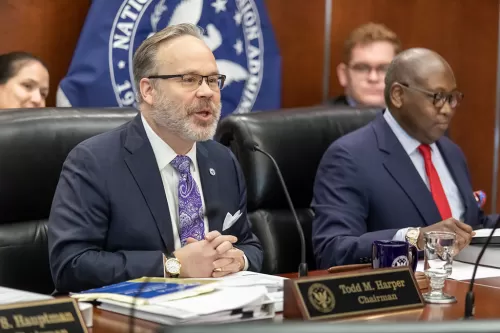NCUA Chairman Todd M. Harper during a meeting of the NCUA Board.
As Prepared for Delivery on February 16, 2023
Thank you, Rita, Rob, and Ian, for your presentation today on this proposed rule to amend the National Credit Union Administration’s chartering and field-of-membership regulations with respect to the provision of financial services to under-resourced communities. Together, these changes would aid in expanding access to safe, fair, and affordable financial products to more households and in communities across the country.
The proposed rule we are considering today is a product of the NCUA’s ACCESS Initiative, which began under then-Chairman Hood. I want to recognize and thank Board Member Hood for his leadership on the issue of financial inclusion and for challenging the NCUA team to find new ways to make affordable financial services more available in rural communities, inner cities, and all other under-resourced places in between.
The credit union system is at its best when the dual chartering system is strong and vibrant. Yet, with respect to field-of-membership options, the federal charter lags significantly behind the state charter. According to an analysis by NCUA’s Office of Credit Union Resources and Expansion, 91 of the 100 largest potential fields of membership in the system are state charters.
Ultimately, it’s Congress’s decision whether to amend the Federal Credit Union Act’s field-of-membership requirements to achieve greater parity with the rules in many states. However, where we can within our existing rules and the law’s current requirements, the NCUA Board should take appropriate and tailored action to simplify, streamline, and strengthen federal chartering options.
Together, these nine proposed changes won’t close the wide gap between the field-of-membership options for federal and state charters, but they will make some meaningful changes to enhance consumer access to financial services. The proposal would also make technical corrections and clarify the process for the NCUA’s reviews of chartering and field-of-membership changes.
One of the nine changes in this proposed rule would eliminate the business and marketing plan requirements for certain federally insured, state-chartered credit unions that seek to convert to a federal charter while serving the exact same community field of membership. If a credit union is already serving the community and won’t be changing the boundaries of that community, we shouldn’t have to make that credit union jump through an unnecessary paperwork hoop.
Another change in the proposed rule would expand the community-based chartering options to recognize the changes in work habits accelerated by the pandemic. As such, more of those individuals who telework or work remotely would become eligible for membership for companies headquartered within the community. And, another proposed regulatory change would better capture the ongoing bond between individuals within a field of membership and their immediate family members following the death of the member.
I plan to support this proposed rule and look forward to reviewing the comments, but I do have one question. The NCUA’s current rules reiterate the U.S. Treasury Department’s Community Development Financial Institutions Fund’s economic distress criteria that have been in place for nearly 15 years. But, the CDFI Fund is also now proposing changes to its certification and recertification requirements. Would those proposed CDFI rule changes affect the economic distress criteria that we use for the NCUA’s rules?
Thank you for clarifying that important issue. During the development of this proposal, we found that once an area meets the CDFI’s economic distress criteria and is underserved by other depository institutions, the area already has significant unmet needs. Having federal credit unions detail in their applications any significant unmet needs is redundant, time consuming, and provides little value. This is a good change to make.
In sum, this proposal makes modest, but important, modifications to the agency’s field-of-membership regulations and chartering rules for federal credit unions. I thank both the staff for their excellent work and my fellow Board members for their thoughtful suggestions.
That concludes my remarks. I now recognize Vice Chairman Hauptman.



